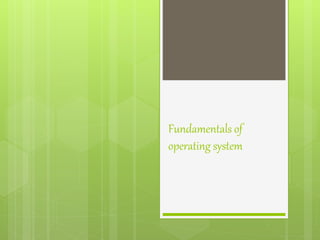
Fundamentals of operating system maam lugas.pptx
- 2. What is Operating System? An Operating System (OS) is an interface between a computer user and computer hardware. An operating system is a software which performs all the basic tasks like file management, memory management, process management, handling input and output, and controlling peripheral devices such as disk drives and printers.
- 3. Generally, a Computer System consists of the following components: Computer Users are the users who use the overall computer system Application Softwares are the softwares which users use directly to perform different activities. These softwares are simple and easy to use like Browsers, Word, Excel, different Editors, Games etc. These are usually written in high-level languages, such as Python, Java and C++.
- 4. System Softwares are the softwares which are more complex in nature and they are more near to computer hardware. These software are usually written in low-level languages like assembly language and includes Operating Systems (Microsoft Windows, macOS, and Linux), Compiler, and Assembler etc. Computer Hardware includes Monitor, Keyboard, CPU, Disks, Memory, etc.
- 5. So now let's put it in simple words: If we consider a Computer Hardware is body of the Computer System, then we can say an Operating System is its soul which brings it alive ie. operational. We can never use a Computer System if it does not have an Operating System installed on it.
- 6. Operating System - Examples There are plenty of Operating Systems available in the market which include paid and unpaid (Open Source). Following are the examples of the few most popular Operating Systems:
- 7. Operating System - Examples Windows: This is one of the most popular and commercial operating systems developed and marketed by Microsoft. It has different versions in the market like Windows 8, Windows 10 etc and most of them are paid.
- 8. Linux This is a Unix based and the most loved operating system first released on September 17, 1991 by Linus Torvalds. Today, it has 30+ variants available like Fedora, OpenSUSE, CentOS, UBuntu etc. Most of them are available free of charges though you can have their enterprise versions by paying a nominal license fee. MacOS This is again a kind of Unix operating system developed and marketed by Apple Inc. since 2001.
- 9. iOS This is a mobile operating system created and developed by Apple Inc. exclusively for its mobile devices like iPhone and iPad etc. Android This is a mobile Operating System based on a modified version of the Linux kernel and other open source software, designed primarily for touchscreen mobile devices such as smartphones and tablets. Some other old but popular Operating Systems include Solaris, VMS, OS/400, AIX, z/OS, etc.
- 10. Operating System - Functions To brief, Following are some of important functions of an operating System which we will look in more detail in upcoming chapters:
- 11. Operating System - Functions Process Management I/O Device Management File Management Network Management Main Memory Management Secondary Storage Management Security Management Command Interpreter System Control over system performance
- 12. Job Accounting Error Detection and Correction Coordination between other software and users Many more other important tasks
- 13. Operating Systems - History Operating systems have been evolving through the years. In the 1950s, computers were limited to running one program at a time like a calculator, but later in the following decades, computers began to include more and more software programs, sometimes called libraries, that formed the basis for today’s operating systems.
- 14. The first Operating System was created by General Motors in 1956 to run a single IBM mainframe computer, its name was the IBM 704. IBM was the first computer manufacturer to develop operating systems and distribute them in its computers in the 1960s.
- 15. There are few facts about Operating System evaluation: Stanford Research Institute developed the oN-Line System (NLS) in the late 1960s, which was the first operating system that resembled the desktop operating system we use today. Microsoft bought QDOS (Quick and Dirty Operating System) in 1981 and branded it as Microsoft Operating System (MS-DOS). As of 1994, Microsoft had stopped supporting MS- DOS.
- 16. Unix was developed in the mid-1960s by the Massachusetts Institute of Technology, AT&T Bell Labs, and General Electric as a joint effort. Initially it was named MULTICS, which stands for Multiplexed Operating and Computing System. FreeBSD is also a popular UNIX derivative, originating from the BSD project at Berkeley. All modern Macintosh computers run a modified version of FreeBSD (OS X).
- 17. Windows 95 is a consumer-oriented graphical user interface-based operating system built on top of MS-DOS. It was released on August 24, 1995 by Microsoft as part of its Windows 9x family of operating systems. Solaris is a proprietary Unix operating system originally developed by Sun Microsystems in 1991. After the Sun acquisition by Oracle in 2010 it was renamed Oracle Solaris.
- 18. Why to Learn Operating System If you are aspiring to become a Great Computer Programmer then it is highly recommended to understand how exactly an Operating System works inside out. This gives opportunity to understand how exactly data is saved in the disk, how different processes are created and scheduled to run by the CPU, how to interact with different I/O devices and ports.
- 19. There are various low level concepts which help a programmer to Design and Develop scalable softwares. Bottom line is without a good understanding of Operating System Concepts, it can't be assumed someone to be a good Computer Application Software developer, and even it is unimaginable imagine someone to become a System Software developer without knowing Operating System in-depth.
- 20. If you are a fresher and applying for a job in any standard company like Google, Microsoft, Amazon, IBM etc then it is very much possible that you will be asked questions related to Operating System concepts.
